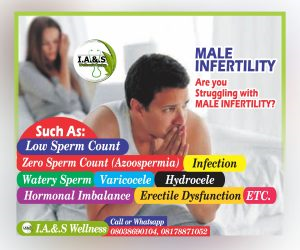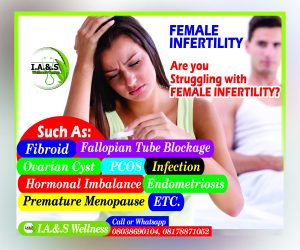WHAT IS POLYCYSTIC OVARY SYNDROME (PCOS)?
PCOS stands for Polycystic Ovary Syndrome, which is a hormonal disorder common among women of reproductive age. It affects the ovaries and can lead to irregular menstrual cycles, excess androgen (male hormone) levels, and small fluid-filled sacs (cysts) in the ovaries.
Some common symptoms of PCOS include:
- Irregular periods or no periods at all
- Difficulty getting pregnant (due to irregular ovulation)
- Excessive hair growth on the face, chest, back (hirsutism)
- Weight gain or difficulty losing weight
- Acne or oily skin
- Thinning hair or hair loss on the scalp
- Darkening of skin, particularly along neck creases, in the groin, and underneath breasts (acanthosis nigricans)
PCOS can also lead to long-term health problems such as diabetes, high blood pressure, and heart disease if not managed properly. Treatment typically focuses on managing symptoms and may include lifestyle changes (such as diet and exercise), medications (such as hormonal contraceptives or metformin), and sometimes fertility treatments if pregnancy is desired.
If you or someone you know suspects they have PCOS, it’s important to consult a healthcare provider for proper diagnosis and management. Early detection and treatment can help manage symptoms and prevent complications.
CAUSES OF PCOS
The exact cause of PCOS (Polycystic Ovary Syndrome) is not fully understood, but it is believed to involve a combination of genetic and environmental factors. Here are some potential factors that contribute to the development of PCOS:
Hormonal Imbalance: One of the key features of PCOS is an imbalance in reproductive hormones, particularly higher levels of androgens (male hormones) such as testosterone. This imbalance can disrupt the normal function of the ovaries, leading to irregular menstrual cycles and the development of cysts.
Insulin Resistance: Many individuals with PCOS have insulin resistance, where the body’s cells do not respond effectively to insulin. This can lead to high levels of insulin in the blood, which in turn can increase androgen production by the ovaries. Insulin resistance is also associated with weight gain and difficulty in losing weight, which are common in PCOS.
Genetics: There appears to be a genetic component to PCOS, as it tends to run in families. Having a family member with PCOS increases the likelihood of developing the condition.
Inflammation: Chronic low-grade inflammation may play a role in the development of PCOS and its associated symptoms. Inflammation can affect hormone production and insulin sensitivity.
Lifestyle Factors: Factors such as unhealthy diet, lack of physical activity, and excess weight or obesity can contribute to insulin resistance and hormonal imbalances, exacerbating symptoms of PCOS.
Environmental Factors: Exposure to certain environmental factors, such as endocrine-disrupting chemicals (e.g., bisphenol A), may also contribute to the development or worsening of PCOS symptoms by interfering with hormone regulation.
TYPES OF PCOS
PCOS, or Polycystic Ovary Syndrome, can present in various types or phenotypes, which refer to different patterns of symptoms and characteristics. These types are typically based on clinical manifestations and hormonal profiles. Here are the main types of PCOS:
Insulin-Resistant PCOS (Classic PCOS):
- This type is characterized by insulin resistance, where the body’s cells do not respond effectively to insulin, leading to high levels of insulin in the blood.
- Symptoms include irregular periods or no periods, weight gain, difficulty losing weight, and sometimes signs of high androgens (male hormones) such as acne and excess hair growth.
Non-Insulin-Resistant PCOS:
- In this type, insulin resistance may not be a prominent feature.
- It shares some symptoms with classic PCOS but may have a different metabolic profile and response to treatment.
Post-Pill PCOS:
- Some women develop PCOS-like symptoms after discontinuing certain hormonal contraceptives (especially those with anti-androgenic properties).
- This type typically involves irregular periods, acne, and sometimes increased androgen levels.
Adrenal PCOS:
- This type involves higher levels of adrenal androgens (hormones produced by the adrenal glands) rather than ovarian androgens.
- Symptoms may include irregular periods, acne, and signs of excess androgens.
Inflammatory PCOS:
- Inflammation plays a significant role in this type of PCOS.
- Women with this type may experience more severe symptoms related to inflammation, such as insulin resistance, irregular periods, and possibly more pronounced metabolic disturbances.
SYMPTOMS OF PCOS
PCOS, or Polycystic Ovary Syndrome, is a hormonal disorder that affects women of reproductive age. Its symptoms can vary widely among individuals, but common signs and symptoms include:
Irregular periods: Women with PCOS often have irregular menstrual cycles, which may be infrequent or prolonged.
Excess androgen: Elevated levels of male hormones (androgens) may result in physical signs such as excess facial or body hair (hirsutism). This can also cause acne and male-pattern baldness.
Polycystic ovaries: On ultrasound, ovaries affected by PCOS may appear enlarged and contain numerous small fluid-filled sacs (follicles) which surround the eggs.
Insulin resistance: Many women with PCOS have insulin resistance, which can lead to high blood sugar levels and an increased risk of developing type 2 diabetes.
Weight gain: Difficulty losing weight or weight gain, particularly around the abdomen, is common in women with PCOS.
Skin problems: Skin tags, darkening of the skin (acanthosis nigricans), and skin discolorations can occur due to hormonal changes.
Thinning hair: Hair loss or thinning of hair on the scalp, similar to male-pattern baldness, may occur in women with PCOS.
Fertility issues: PCOS is a leading cause of female infertility due to irregular ovulation or failure to ovulate.
Mood changes: Women with PCOS may experience mood swings, depression, or anxiety.
Sleep problems: Sleep apnea or other sleep disturbances can be associated with PCOS, especially in cases of obesity.
TREATMENT OF PCOS
PROMO PRICE OF POLYCYSTIC OVARY SYNDROME TREATMENT KIT
Half (1/2) Batch -N180,000=1& Half Month Treatment Supply(45 days)
1 Batch -N300,000=3 Months Treatment supply once(90 days)
we also have *SPECIAL PACKAGE ALSO RUNNING ON PROMO PRICE PRESENTLY !!!*
The Package is for people with ovarian cysts plus other gynecology issues, such as any of the following listed below:
-Fibroid
-Fallopian tube blockage
-Ovarian cyst
Endometriosis etc.
PROMO PRICE OF SPECIAL PACKAGE
Half (1/2) Batch -N200,000=1& Half Month Treatment Supply(45 days)
1 Batch -N350,000=3 Months Treatment supply once(90 days)
(Note: Promo Ends Soon.)
Free Delivery To All States In Nigeria
&
PAYMENT ON DELIVERY
(That means we first deliver and when you receive the product you pay)
This promo is limited for a short time.
HOW TO PLACE YOUR ORDER
PAY N5,000 UPFRONT AS COMMITMENT FEE
This is a new policy: Commitment Fee will serve as a proof of interest in getting the treatment delivered to you while you pay the balance when you receive the medicines.
For example, If your treatment total is N250,000 you will pay N5,000 commitment fee and pay the rest of N245,000 when the medicine is delivered to you.
REASON FOR COMMITMENT FEE:
We operate pay on delivery service but from experience people are abusing the service of pay on delivery, after we must have spent money to send/ship the order they placed, at the point of delivery you will hear excuses like “I have spent the money, I travelled, I was just joking with the order…so many other excuses which are heart-breaking and unfair.
So the commitment fee will help us identify those who are fully ready.
Thanks for your understanding, you can now proceed to place your order below, if you are fully ready for it.
Our account for the commitment fee is:
ACCOUNT NAME: I. A. & S. NATURAL MEDICARE INTERNATIONAL.
ACCOUNT NUMBER: 0432034997
BANK: GAURANTEE TRUST BANK (GTBANK)
OUR CLINIC ADDRESS
3rd Floor, 4 Story Building, Opposite Heritage Mall, U-turn Bus Stop, Abule Egba, Lagos, Nigeria.
CUSTOMER CARE NUMBER: 08038690104 (CALL OR WHATSAPP)
VISITING HOURS FOR LAGOS RESIDENTS: MONDAY- FRIDAY 8AM-5PM
SATURDAY: 9AM-3PM
DELIVERY TIME
Once we receive your order as well as your commitment fee.
Our rep. will process your order within 24 hours to verify and to process your order for shipping.
We will ship your order through one of our partner courier companies (DHL, Fedex or GIG Logistics, Gokada).
It will be delivered within 1-5 days expect call or message from them once the medicines arrives your location.
ORDER FOR PCOS TREATMENT HERE
Fill the order form below:
OTHER TREATMENT WE OFFER


